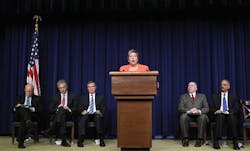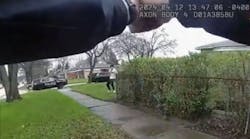WASHINGTON -- The Obama administration announced a broadside of harsh new sanctions against four far-flung criminal cartels on Monday, part of what it said is a coordinated strategy to fight international underworld factions that could harm U.S. interests or security.
A new executive order signed by President Barack Obama outlined a regime of harsh sanctions against so-called transnational criminal groups, blocking any American property interests and freezing their assets, authorizing financial sanctions against anyone aiding them and barring their members from entering the United States.
The order, signed Sunday, authorizes new sanctions against criminal cartels in Mexico, Japan, Italy and Eastern Europe: Los Zetas, a Mexican drug ring linked to multiple murders; the Yakuza, Japan's widespread mob army; the Camorra, a crime network based in southern Italy; and the Brothers' Circle, an Eastern European criminal group operating worldwide.
The new moves come as the administration is animating a long-scattered effort to confront global crime groups suspected of transporting drugs and weapons and enabling terrorist groups. While the U.S. war against terrorist networks has been a clear foreign policy priority since the Sept. 11, 2001, attacks against the United States, its handling of "transnational" crime groups has been uneven at times and fragmented among federal agencies.
In announcing the new moves, Attorney General Eric Holder acknowledged Monday that "the problem of transnational organized crime and their networks is not new." He insisted that a year-long review by administration officials, the first in 15 years, "has strengthened our fight."
A 28-page report outlining the new strategy conceded that "a shift in U.S. intelligence collection priorities since the September 11 2001 attacks left significant gaps" in intelligence aimed at transnational criminal organizations. "The fluid nature" of such groups, which often rely on shell corporations, offshore bank accounts and bases in countries with lax law enforcement, makes targeting them "increasingly difficult," the report warned.
"Transnational criminal organizations have taken advantage of our increasingly interconnected world to expand their illicit enterprises," Obama wrote in the report's foreword.
Under the new strategy, the Justice Department and the FBI would appear to have heightened roles in the government's effort to tackle transnational threats. The National Security Council has long been the lead agency in targeting transnational threats during the Clinton and Bush administrations, and will retain a prime role, helping to oversee combined law enforcement, intelligence and military agencies.
Holder said his department would press to update anti-racketeering laws and extend other statutes to combat money laundering, arms trafficking, cybercrime and intellectual property offenses. David Cohen, who heads the Treasury Department's Terrorism and Financial Intelligence office, said the U.S. also now would target international criminal groups with the same arsenal of financial penalties long used against al-Qaida and other militant groups.
Obama's executive order, Cohen said, allows Treasury to take on international criminal groups by freezing their assets in the U.S. or the American financial system and pursuing criminal charges against anyone cutting business deals with them. Cohen said Treasury would move quickly to use its authority against the four international crime syndicates.
Los Zetas is a narcotic smuggling cartel that dates to the late 1990s and began as a mercenary group aimed at killing rival drug dealers. The group is "responsible for numerous murders," including several of U.S. law enforcement officials, Cohen said. The group had already been designated under Treasury's "drug kingpin" sanctions.
Japan's Yakuza, portrayed in numerous gangland films, has an estimated 80,000 members, officials said. Its narcotics and criminal enterprises are hidden by investments in construction, real estate, finance and other legal businesses.
The Camorra, centered in Naples but spread throughout Italy, earns $25 billion a year in global operations, officials said, in criminal activity ranging from drug trafficking to counterfeiting.
The Brothers' Circle, also known as Moscow Center, is an underworld society spread throughout Russia and former Soviet satellites. Its members are multiethnic, officials said, and conduct a variety of criminal activities in the Middle East, Africa and Latin America.




